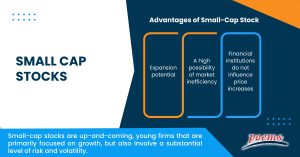Small Cap Stocks
Table of Contents
What are small cap stocks?
Small-cap stocks are up-and-coming, young firms that are primarily focused on growth, but also involve a substantial level of risk and volatility. Investing in small-cap stocks offers the opportunity to outperform institutional investors, who can occasionally outperform large-cap firms.
Features of Small Cap Stocks
Market capitalisation represents the market value of a publicly traded corporation listed on the stock exchange. Small-cap stocks involve companies with modest sales and, thus, reduced capitalisation. Small-cap companies often have a smaller staff and weaker business management than large- and mid-cap companies. However, both large-cap and mid-cap corporations were formerly tiny enterprises that increased in capital size over time.
Notable characteristics of small-cap stocks include:
- Expansion Factor
Small-cap stocks have the potential for a fast growth rate and, thus, the ability to provide investors with substantial returns, perhaps as high as 100 per cent. They offer the chance for wealth creation, which makes them an appealing investment path. Identifying the appropriate stocks and keeping them for an extended period of time can result in substantial profits and capital appreciation. The stocks are sometimes referred to as “multi-baggers” because, relative to their bigger cousins, they may generate exceptionally significant returns.
- Extreme Volatility
Small-cap stocks are also extremely volatile since they can decline rapidly during a bear market. Small-cap firms have fewer revenue streams than large-cap organizations, which are diverse company and operate in several industries.
Similar to large-cap corporations, mid-cap stocks are more established with more cash flow/capital and a broader range of products and services. They steadily increase their market share, often engaging in mergers and acquisitions, and becoming more stable than their small-cap competitors.
- Low-Priced Securities
Small-cap stocks have a lower market capitalisation and outstanding shares. And due to the under-recognition of their firms in inefficient marketplaces, their stock is likewise undervalued.
If investors purchase high-quality equities at a discount , they have an edge over institutional investors. Small-cap stocks eventually obtain recognition and funding owing to their greater organic growth rate. And by the time seasoned investors develop interest in these firms, which cause their share prices to rise, you will have earned optimal returns on the equities purchased at reasonable costs.
- Liquidity
Among big, medium, and small-sized enterprises, small-cap stocks are the least liquid due to their low trading volume. And as they are less well-known and difficult to trade, they offer less liquidity. Therefore, small-cap stocks should not be used for short-term investing.
Small-cap stocks are extremely volatile and exposed to market hazards. This is the greatest risk associated with small-cap stock investing. So, before investing in small-cap stocks, investors must conduct extensive research and make prudent asset allocation decisions. This is due to the fact that while small-cap stocks can create profits, also invest in less volatile assets to mitigate the risk.
Conservative investors can invest at least 10 percent of their portfolio in small-cap stocks, while aggressive investors can invest a substantial amount in tiny stocks.
Advantages of Small-Cap Stock

- Expansion potential
Small-cap enterprises have much greater growth potential than larger firms. Most small-cap firms have greater growth potential than large-cap corporations, making them appealing investment possibilities.
- A high possibility of market inefficiency
It is more difficult to get information regarding small-cap stocks compared to large and mid-sized firms. There is also a strong possibility that small-cap stocks are priced incorrectly since analysts often pay little attention to them. This offers investors the opportunity to capitalise on pricing inefficiencies and earn a substantial return on investments.
- Financial institutions do not influence price increases
Financial institutions, such as mutual and hedge funds, must adhere to various restrictions that prohibit them from making substantial investments in small-cap stocks. Due of this, it is unlikely that the stock price would be artificially inflated by significant financial institution investments.
Risks of Small Cap Stocks
- High risk
Investing in small-cap stocks carries a greater degree of risk. Small-cap enterprises may have a flawed and unstable business plan. In this situation, if the company’s management is unable to modify the business model, operational and financial outcomes suffer.
In addition, small-cap firms typically have less access to fresh capital and finance. Due to this, it is probable that the company will be unable to close cashflow gaps or develop the business due to its inability to make the necessary investments.
- Low liquidity
Small-cap stocks have less liquidity than large-cap equities. Due to low liquidity, it may be impossible to acquire the stock at a reasonable price, or it may be difficult to sell the stock at a favorable price. Additionally, less liquidity increases the total risk of the stock.
- Time-consuming
Small-cap stock investing can be a time-consuming endeavor. Due to the under-coverage of small-cap equities by financial institutions and analysts, small-cap company research is typically scarce.
Alternatives
A willing investor in small-cap stocks should devote time to business research to evaluate whether the investment is prudent.
Also, if investors lack the risk tolerance to withstand market volatility, they can choose a less hazardous investment alternative.
Investors can choose alternative investment opportunities.
- Large-cap stocks – Large-cap equities are more resistant to market volatility. This renders them appropriate for long-term investors with a moderate to low risk tolerance.
- Balanced Funds – As an alternate investing option, investors may also consider hybrid funds or balanced funds.
- Hybrid funds offer the ideal combination of debt and stocks. They immediately enables investors to diversify their portfolios in order to mitigate risk and secure rewards.
- Government obligations: Additionally, individuals can invest in government securities. Typically, they are government-issued debt securities, making them appropriate for risk-averse investors seeking predictable and guaranteed returns.
Whether investing in small-cap stocks or mutual funds, investors should always choose a vehicle that meets their needs and financial situation.
Frequently Asked Questions
Small-cap stocks are typically riskier investments than large-cap stocks. They have higher growth potential and often offer superior long-term profits, but lack the resources of large-cap corporations, leaving them more susceptible to adverse occurrences and pessimistic views.
Among the arguments for why small cap stocks may fare better than large cap stocks in an inflationary climate is that it may be simpler for smaller firms to pivot and make changes in this sort of market.
Over the long term, small caps tend to outperform large-cap companies, and therefore a person with a 5 to 10-year investment horizon should feel comfortable investing 10 percent to 20 percent of their portfolio in small-cap equities,
Related Terms
- Market maker
- Options expiry
- Payment Date
- Treasury Stock Method
- Reverse stock splits
- Ticker
- Restricted strict unit
- Gordon growth model
- Stock quotes
- Shadow Stock
- Margin stock
- Dedicated Capital
- Whisper stock
- Voting Stock
- Deal Stock
- Market maker
- Options expiry
- Payment Date
- Treasury Stock Method
- Reverse stock splits
- Ticker
- Restricted strict unit
- Gordon growth model
- Stock quotes
- Shadow Stock
- Margin stock
- Dedicated Capital
- Whisper stock
- Voting Stock
- Deal Stock
- Microcap stock
- Capital Surplus
- Multi-bagger Stocks
- Shopped stock
- Secondary stocks
- Screen stocks
- Quarter stock
- Orphan stock
- One-decision stock
- Repurchase of stock
- Stock market crash
- Half stock
- Stock options
- Stock split
- Foreign exchange markets
- Stock Market
- FAANG stocks
- Unborrowable stock
- Joint-stock company
- Over-the-counter stocks
- Watered stock
- Zero-dividend preferred stock
- Bid price
- Authorised shares
- Auction markets
- Market capitalisation
- Arbitrage
- Market capitalisation rate
- Garbatrage
- Autoregressive
- Stockholder
- Penny stock
- Noncyclical Stocks
- Hybrid Stocks
- Large Cap Stocks
- Mid Cap Stocks
- Common Stock
- Preferred Stock
- Earnings Per Share (EPS)
- Diluted Earnings Per Share
- Dividend Yield
- Cyclical Stock
- Blue Chip Stocks
- Averaging Down
Most Popular Terms
Other Terms
- Direct market access
- Deficit interest
- Strong order book
- Economic calendar
- EPS forecast
- Fiat money
- Adjusted distributed income
- International securities exchanges
- Settlement currency
- Federal funds rate
- Active Tranche
- Convertible Securities
- Synthetic ETF
- Physical ETF
- Initial Public Offering
- Buyback
- Secondary Sharing
- Bookrunner
- Notional amount
- Negative convexity
- Jumbo pools
- Inverse floater
- Forward Swap
- Underwriting risk
- Reinvestment risk
- Final Maturity Date
- Secondary Market
- Margin Requirement
- Mark-to-market
- Pledged Asset
- Yield Pickup
- Subordinated Debt
- Trailing Stops
- Stochastic Oscillator
- Bullet Bonds
- Basket Trade
- Contrarian Strategy
- Exchange Control
- Notional Value
- Relevant Cost
- Dow Theory
- Speculation
- Stub
- Trading Volume
- Going Long
- Pink sheet stocks
- Rand cost averaging
- Sustainable investment
- Stop-limit sell order
- Economic Bubble
Know More about
Tools/Educational Resources
Markets Offered by POEMS
Read the Latest Market Journal

继前一篇我们介绍了越南市场后,接下来我们将介绍泰国市场,泰国的表现一样引人瞩目。 受结构性问题影响,相较于菲律宾、马来西亚、印度尼西亚和越南,2023年,泰国全年GDP增幅远低于其他国家。泰国2023年GDP同比2022年增长1.9%,低于市场预测的2.5%。 2023年,中国-东盟自贸协定零关税给泰国带来了直接且沉痛的打击。由于消费疲软、贸易壁垒等政策影响,产能过剩,导致大量低价进口中国商品涌入,使得2023年泰国与东盟9国的总贸易额出现了3年来的首次下滑,其总贸易额为4万亿泰铢(约1489亿新元)。由于巨大的成本价格差异,其中泰贸易逆差扩大至1.29万亿泰铢(约480亿新元)。其中,小家电、蔬果、箱包和服装行业处境最为艰难。 尽管如此,旅游业的复苏增长带动了非农业产业的增长。政府数据显示,2023年来访泰国的总人数达3.15亿人次,较去年增长40.3%。其中,国际游客超过2800万人次,马来西亚和中国为最大客源。随着泰国对中国和哈萨克斯坦实施免签政策和其他活动措施,预计2024年将带来更多游客,推动泰国旅游业的复苏进程,并力争实现2024年旅游营业收入达到3.5亿泰铢(约0.12亿新元)的目标。 热销股票 1. ADVANCED INFO SERVICE PUBLIC CO., AIS,AIS通信(ADVANC.TH) AIS通信是泰国的最大移动运营商,主要经营三大业务线,包括移动业务、AIS Fibre品牌下的高速家庭宽带业务,以及企业业务。同时AIS也提供多样化的数字生活服务。AIS通过数字智能基础设施、跨行业合作和人力资本与可持续发展这三方面,致力于“成为泰国最受尊敬的认知科技公司”的愿景。 (来源:AIS2023财年年报)...

指数差价合约是区别于投资个股、指数期货或交易所交易基金(ETF)的一种热门替代品,因为该工具允许您获得特定指数的风险投资组合,并从柜台价格走势中获益,无论做多或做空。此外,由于差价合约的杠杆特性,交易者只需拿出合约价值的一小部分作为初始合约的抵押品即可启动一笔合约。这样,交易者就可以方便快捷地进行整个市场的交易。 本期重点摘要: 股票指数只是一组资产的集合,它概括了股市中某一行业板块的表现。许多此类指数根据不同的标准包含和/或排除某些股票。 指数差价合约有助于利用构成单一指数的各种股票分散您的投资组合、实现投资组合多样化。这也有助于避免 “选择悖论”:指数帮助您决定投资哪些股票。 最重要的是,指数差价合约让交易者获得对指数的接触,而不用购买组成指数的个股。这种具有成本效益的策略让您只需交易指数的价格变化,而无需拥有相关指数本身。 什么是股票指数? 当人们说 “今天市场上涨了 “或 “市场下跌了 “时,你会不会好奇,分析师是如何评估整个市场? 这很简单,他们只需分别将按照今天的报价和昨天的报价购买所有公司所需的金额相加。两相比较下,如果发现今天的数字大于前一天的数字,那么我们就知道今天的市场上涨了,反之亦然。然而,数字的汇总和对比可能会很繁琐和麻烦。创建指数就是为了方便测量。 因此,”股票指数 “一词指的是一组股票(或其他资产)的集合,它提供了股票市场特定部分表现的概况。该指数被用作一个替代指标,用来衡量市场在特定时间段内的涨跌情况,比如以上例子中所描述的逐日指数。...

本文旨在为中级外汇交易者提供必要的信息和知识。它将涵盖我们上一篇文章 “五分钟看懂世界上最活跃的市场-外汇差价合约(FX CFD)...

解锁台湾股市的投资潜力!深入了解由强大的技术驱动型经济推动的股票市场,2023 年机械和电气设备将占出口的 69%。在政治稳定、投资者友好的法规和健全的法律框架下,探索台积电和富士康等全球顶级企业。台湾股市值得称赞的历史表现和在国际贸易中的的重要性使其更具吸引力。在这个科技实力雄厚、经济稳定、充满活力的股票市场中,抓住增长机遇!

了解外汇市场 外汇交易市场又称外汇市场,是一个买卖货币的全球性金融市场。它是全世界规模最大、流动性最强的金融市场,每日交易量超过 6 万亿美元。但外汇市场有一个重要却常被忽视的一点,就是它受交易心理的影响。在本文中,我们将探讨外汇市场的复杂性,还有把重点放在交易心理与传统交易策略共同发挥的关键作用...

五分钟看懂世界上最活跃的市场 -外汇差价合约(FX CFD)
外汇交易市场俗称外汇或外汇市场,是全球金融市场的支柱。它是世界上最活跃的市场,2022 年 4 月,全球交易额达到创纪录的每天 7.5 万亿美元[1] 。这个活跃的市场为交易者提供了利用货币价格波动赚取利润的机会。在本文中,我们将解释外汇市场的基本原理,助您了解其投资机制。 什么是外汇? 外汇市场是一个分散的全球市场,世界上所有货币都在这里进行交易...






















